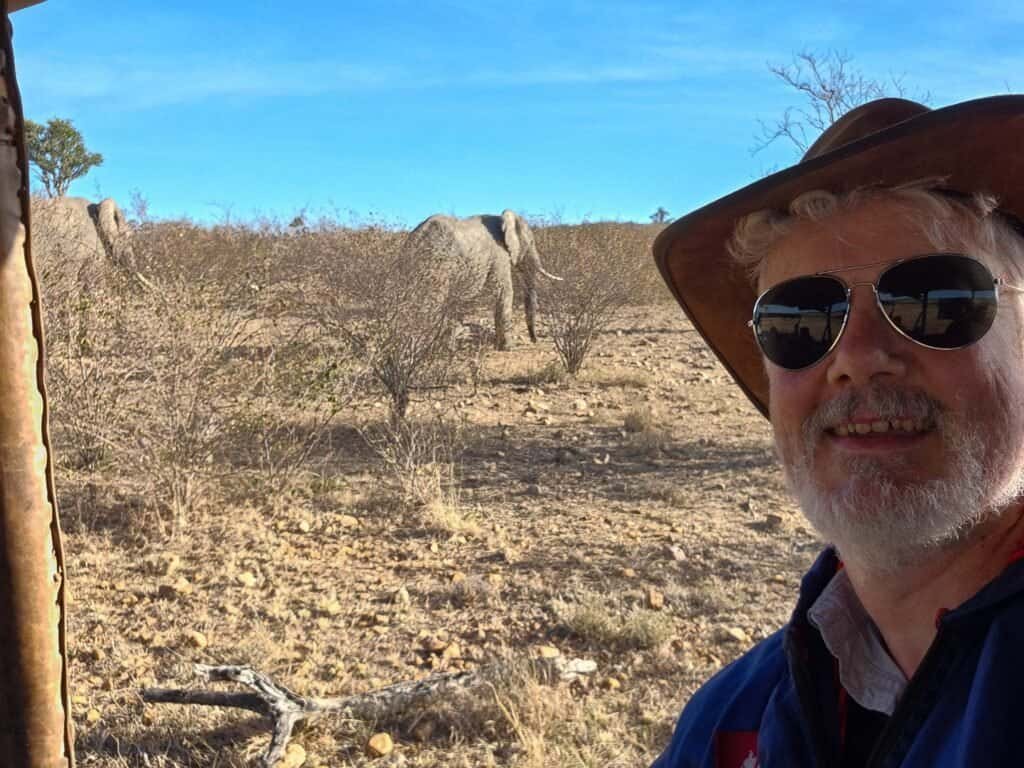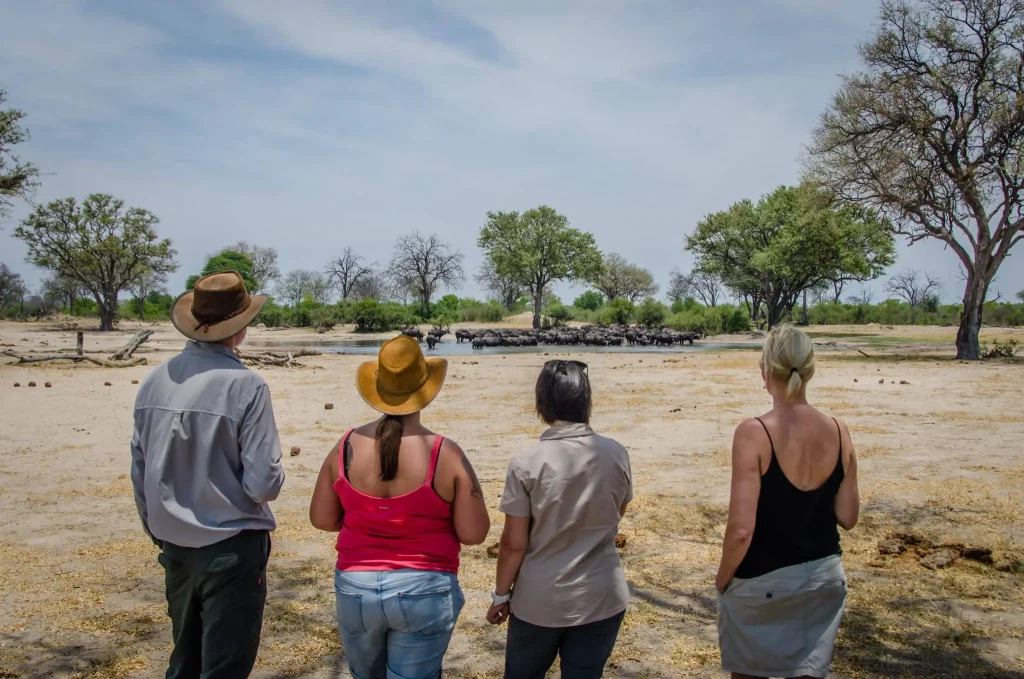Imagine stepping off a small plane onto a dirt airstrip in the heart of Africa, the late-afternoon sun painting the horizon in brilliant oranges and purples. You catch your breath—not just because the view is so spectacular, but because a quiet, persistent voice inside your head wonders, “Am I too old to be doing this?”
Perhaps you’ve already seen a handful of birthdays well beyond the sprinting pace of youth, or you have a niggling worry about comfort and safety. Yet here you are, about to embark on a new adventure that just might surpass anything you experienced in your twenties or thirties.

For many travellers over 40, the desire for meaningful experiences grows stronger, even as small anxieties tug at the edges of excitement. Questions about health precautions, physical ability, or overall security can feel daunting—especially when the destination is Africa, a continent often portrayed as both majestic and challenging. But the truth is, your forties, fifties, and beyond can become your best travel years yet, precisely because you bring life experience, measured confidence, and a hunger for deeper connections.
Over the course of my career designing African itineraries, I’ve seen countless individuals in midlife transform their anxieties into unbreakable memories. They arrived nervous about bumpy roads or unfamiliar wildlife. They left enchanted by sunsets over the savannah, invigorated by meeting local communities, and even surprised at how well they adapted to a slower, more mindful pace of travel. In this article, we’ll explore how to overcome common fears—ranging from health issues to the so-called “I’m-too-old-for-this” mindset—so you can discover why there’s truly no better time to embrace Africa’s wonders than right now.
Addressing Safety and Health Concerns
When planning a trip to Africa, safety questions often loom large, especially for those who are a few decades past the carefree backpacking age. It’s natural to wonder about potential risks—whether that’s encountering wildlife face-to-face, navigating unfamiliar roads, or worrying about access to reliable healthcare. Yet, the reality for most modern safaris and tours is far more reassuring than sensational headlines might suggest.
- Healthcare and Vaccinations:
First, let’s talk health. Many of my clients picture themselves far from civilization, fearing there’s no medical help for miles around. But in truth, most reputable safari lodges are within reach of well-equipped clinics or operate under strict protocols with emergency procedures in place. Vaccinations like yellow fever or prophylactics for malaria do require a bit of planning, but they’re part of a well-charted path that thousands follow every year. Think of them as your travel armour—a simple layer of protection that ensures you can wander with peace of mind. If you compare it to a metaphorical shield, imagine stepping onto the savannah feeling prepared, rather than vulnerable. - Choosing Responsible Operators:
Another cornerstone of feeling secure is selecting the right travel partners. I once arranged a private safari for a group of women all in their early fifties. Their biggest worry? Stepping off an airplane into the unknown. But they had chosen a lodge that not only excelled in wildlife conservation but also championed robust safety measures. Trained guides, well-maintained vehicles, and clear emergency protocols can make all the difference between anxiety and ease. In fact, the women ended up calling me halfway through the trip to gush about how they felt more cared for in the bush than in some five-star city hotels. A reputable operator becomes your safety net, allowing you to lose yourself in the joys of nature without losing peace of mind. - Securing Travel Insurance:
Finally, there’s travel insurance—perhaps not the most glamorous topic, but certainly one of the most impactful. As someone who’s spent years crafting itineraries, I’ve witnessed how a comprehensive policy offers a layer of reassurance that can’t be overstated. One couple in their late forties confessed they’d put off visiting Africa for fear of the “what ifs.” After they secured a solid insurance plan covering medical evacuation, trip interruption, and baggage loss, their outlook shifted from fretful to excited. It was like watching storm clouds part to reveal a brilliant sky. You want the freedom to chase giraffes across golden plains or savor a local meal under the stars, knowing you’re covered if an unexpected hiccup arises.
These practical steps—health preparations, responsible lodge selections, and reliable insurance—are the framework that transforms apprehension into confidence. With these measures in place, you’ll discover that Africa’s raw beauty is far more accessible and nurturing than you might imagine. And once the specter of safety concerns fades, you’re left with what truly matters: the awe of witnessing elephants at a watering hole, the thrill of hearing distant lions at night, and the quiet realization that age isn’t a barrier but an asset, guiding you toward richer, more meaningful travels.
Finding Comfort and Confidence Through Planning
Often, the biggest stride toward overcoming travel anxieties is a thoughtful plan that acknowledges both your wishes and worries. By attending to the practical details—like itinerary customization, pace, dietary needs, and communication—you build a sense of control that can dissolve nagging “what ifs” before they even arise.
- Itinerary Customization
Think of your safari itinerary not as a rigid, one-size-fits-all schedule, but as a tapestry you weave based on your unique needs. Perhaps you’re in your late forties and value a few hours of downtime each afternoon, preferring to savour the lodge ambiance rather than racing from one excursion to the next. Or maybe you’re travelling with a partner who’s cautious about long hikes and would appreciate shorter walking safaris. Customization isn’t a luxury; it’s a practical way to ensure every day feels comfortable, invigorating, and suited to your rhythm.- I once planned a trip for a couple—both in their fifties—who worried about overdoing it. By spacing out game drives and including leisurely afternoons by the pool, they returned home raving about how deeply they’d connected with nature, rather than how exhausted they felt.
- Imagine your African adventure as a well-fitted garment: snug in all the right places, with enough room to breathe. No one else can wear it exactly like you do.
- Staying Connected
Another critical ingredient is knowing you’re never fully out of reach. While the idea of “getting away from it all” might appeal, there’s real peace of mind in having reliable phone signal or Wi-Fi, especially if you’re used to checking in with family or keeping an eye on personal matters back home. Most reputable lodges in major safari regions have at least partial connectivity. And if you need occasional digital detox, you can simply power down—but the option is there when you want it.- Case Study: A woman in her late forties, travelling solo, initially hesitated because she worried about staying in touch with elderly parents. Discovering that her lodge had dependable internet and staff who could facilitate Skype calls changed her perspective. She was able to say her nightly hellos, then unplug and fully embrace the sights and sounds of the African bush.
- Building a Support Network
If travelling alone feels overwhelming, consider a small group tour or going with a close friend or relative. Shared experiences can foster camaraderie, diminish anxiety, and heighten fun—especially when everyone’s united by a sense of wonder. Even if you embark solo, you’ll be surrounded by guides, lodge staff, and possibly other guests who quickly become travel companions.- Ask yourself, “Would I feel more comfortable with a buddy system, or do I thrive on solo discovery?” Both can be rewarding. You may find comfort in group dinners under the stars, where swapping stories creates an instant community, or you might relish a private game drive that allows you to delve deeper into your personal fascination with wildlife.
- From my experience, some travellers who arrived with nerves about meeting new people often depart having formed friendships that last years—sending holiday greetings to lodge managers or planning reunions in Africa down the road.
By leaning into these three aspects of planning—tailoring your schedule, ensuring communication options, and establishing a supportive environment—you’re effectively paving the way for a more confident journey. Africa may sometimes be portrayed as unpredictable and wild, but with the right plans in place, you’ll find that beneath its majestic exterior lies a warmth and adaptability ready to cater to your comforts. And once that baseline of security is established, you can let your curiosity and sense of adventure take the lead, experiencing Africa on terms that honour your well-being—and your eagerness for discovery.
Embracing the Rewards of Midlife Travel

By the time you reach your forties, fifties, and beyond, you’ve experienced life’s ebbs and flows—celebrations, lessons, detours, and victories. This depth of experience can actually enhance your journey through Africa, turning a simple trip into something transformative.
- Life Experience as a Strength
- Deeper Conversations and Insights: When you meet local guides or village elders, you may find yourself forging richer connections than you would have decades ago. You bring empathy, patience, and a willingness to listen—qualities that invite genuine, heart-level exchanges.
- Savouring the Moment: Years of juggling responsibilities can teach you how to pause and appreciate life’s beauty when it appears, whether it’s a fleeting sunset over the plains or the way elephants communicate through gentle rumbles. While younger tourists might rush for quick thrills, you’re more likely to let experiences unfold at their own pace, noticing nuances others miss.
- I once guided a small group that included a couple in their mid-fifties. They told me they felt as if they were “finally ready to see Africa,” not just in passing, but in all its subtle depth. They lingered over each wildlife encounter with a sense of wonder I’d rarely seen before, returning home convinced their mature perspectives were exactly what made the trip so special.
- Health Benefits of Adventure
- Physical and Mental Well-Being: Contrary to the notion that adventures are for the young, midlife explorations can reinvigorate body and mind. Gentle activities—like morning game drives or bush walks—keep you active without overexertion. Encountering the raw beauty of Africa often rekindles a sense of childlike awe, flooding you with positive energy.
- Stress Relief and Renewed Passion: There’s something about scanning the savannah for lions or listening to the lullaby of cicadas that dissolves day-to-day worries. Many travellers report returning home with lower stress levels, fresh ideas, and a recharged zest for life.
- Metaphor: Imagine Africa’s wilderness as a grand “reset button,” helping you shed lingering stress. Each sunrise can feel like a gentle nudge, saying, “There’s still so much to discover.”
- Cultural Curiosity and Personal Growth
- Stepping Out of Comfort Zones: Whether you’re sampling local dishes, learning a few phrases in Swahili, or watching traditional dances by the firelight, the cultural tapestry of Africa often sparks personal reflection. These moments become mirrors, reflecting back what resonates with your own life philosophy.
- Wisdom Transfer: Your journeys can also seed new perspectives for those around you—children, friends, coworkers—who see your courage and curiosity as motivation. Sharing stories of meaningful conversations with Maasai guides or nighttime encounters with nocturnal animals can become a source of inspiration for others to break free of their routines.
- A traveller in her early fifties found herself in lively discussions with local artisans about family and tradition. She returned with not just handcrafted souvenirs but also a shifted mindset on heritage, prompting her to research her own ancestral roots back home.
By embracing midlife travel, you invite yourself to explore Africa with a calmer, more seasoned heart. This blend of curiosity and maturity enriches every interaction—turning a safari into a tapestry of discovery, a village visit into an empathetic exchange, and a simple sunrise into a daily reminder that life’s best chapters may well be unfolding now. When you let age become an asset rather than a barrier, each moment feels like a reward for the years of living you’ve already done, and a promise of even greater wonder ahead.
Practical Tips to Ease Common Anxieties

Even the most well-prepared traveller can be rattled by a few lingering fears—whether it’s the thought of flying long distances, navigating language differences, or simply venturing far outside your comfort zone. Fortunately, a handful of practical strategies can help turn those butterflies into a sense of controlled excitement.
- Flight Anxiety Solutions
- Plan Rest Stops and Layovers: Rather than tackling a marathon journey in one stretch, consider breaking it up with an overnight stop or a leisurely layover. This not only combats jet lag, but also gives you breathing room to adjust.
- Mindfulness and Distraction Techniques: Practice simple breathing exercises or download a favorite guided meditation app before takeoff. Bring along an engaging book or podcast—something that sweeps you into a different world.
- Choose Optimal Seating: An aisle seat can offer the freedom to stretch more often; a window seat can grant you a restful sense of privacy. Decide which suits your temperament best.
- Communication Aids
- Local Language Basics: Picking up a handful of phrases—like a simple “Jambo” (hello) in Swahili—adds an element of fun and breaks down barriers. You might be surprised how quickly a warm greeting can lead to a genuine smile or conversation.
- Translation Apps and Lodge Staff: Modern translation apps can bridge language gaps in a pinch, but don’t overlook the fact that many safari lodges employ bilingual or multilingual guides. They’re accustomed to helping guests feel at ease, so lean on their expertise.
- Visual Cues: Even small gestures like pointing to a map or showing a photo can clarify requests when words fall short. For some travellers, creating a small “communication card” with phrases or addresses can also be a handy backup plan.
- Tech Tools for Peace of Mind
- Offline Maps and Emergency Contacts: Download maps of your safari area or major towns before you leave home. Keep a written list of crucial contacts—like lodge numbers, travel insurance info, and local emergency lines—in case your phone battery dies.
- GPS-Enabled Devices: Many safari guides use GPS trackers to pinpoint wildlife or navigate unfamiliar regions. Seeing this in action can alleviate concerns about getting lost, reminding you that someone always knows the route.
- Personal Rituals for Comfort
- Familiarity in the Unknown: Pack small items from home, like a favorite herbal tea, a neck pillow, or a soothing playlist. These comforts act as “anchors,” reminding you that you can bring pieces of your safe routine into new environments.
- Time to Acclimate: If you’ve never set foot on African soil, schedule a relaxed first day at your lodge—easing into local sights and sounds without a hectic agenda. That day of gentle acclimatization often dispels early nerves.
- Adopting a Flexible Mindset
- Embrace the Unexpected: In Africa, everything from spotting a rare bird to a change in weather can shift your plans. Accepting these surprises as part of the experience releases the pressure for perfection.
- Build in Buffer: Leave room in your schedule for the spontaneous—like a last-minute tip from a guide about a hidden watering hole. Knowing you’re not rigidly locked into a timetable frees you from anxious “what-ifs.”
Ultimately, these tips do more than address surface-level concerns; they remind you that Africa, with all its wonders, is navigable in a way that respects your comfort. Little adjustments—like pacing your flights or grabbing the right seat—can make a world of difference in easing nerves. And when your practical bases are covered, you’re more open to those magical moments: a lion’s distant roar at dawn, or a heartfelt conversation with a local artisan. Indeed, every small step toward reassurance paves the way for you to embrace Africa’s grandeur with confidence and excitement.
Conclusion

In the grand tapestry of life, travel is often where our most transformative threads get woven—especially in midlife, when experience meets a still-burning spark of curiosity. By addressing safety and health concerns head-on, tailoring your itinerary to fit your comfort zone, embracing the unique wisdom and perspective that comes with age, and packing practical strategies for common worries, you set the stage for an African journey that can surpass all expectations.
Picture yourself leaning against a safari vehicle at dusk, the distant roar of a lion echoing through the twilight, and a sense of calm gratitude settling over you. It’s a moment that says, “I’m exactly where I’m meant to be,” and it happens when anxieties give way to preparedness, and doubts find answers in concrete planning. Most importantly, it happens when you realize that the experiences you thought were only for the young or the daring are, in fact, yours for the taking.
Now that you’ve glimpsed how manageable and deeply rewarding midlife travel can be, the next move is yours. Speak to an expert, pencil in that first phone call, or start browsing lodges that resonate with your pace and style. After all, you’ve got the life experience to appreciate Africa’s wonders more profoundly—and the readiness to overcome the small hurdles standing between you and a truly life-changing adventure. Your best travel years aren’t behind you; they’re unfolding right now, waiting for you in the heart of the savannah, under starlit skies, and in every new connection you make along the way.
